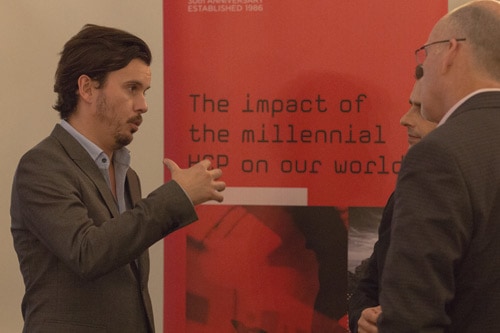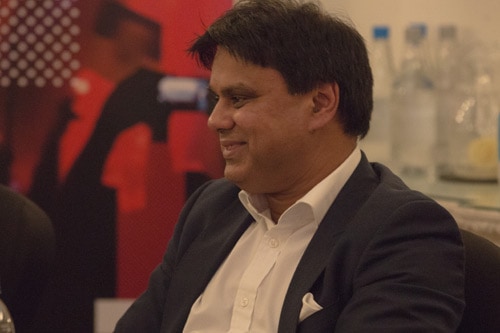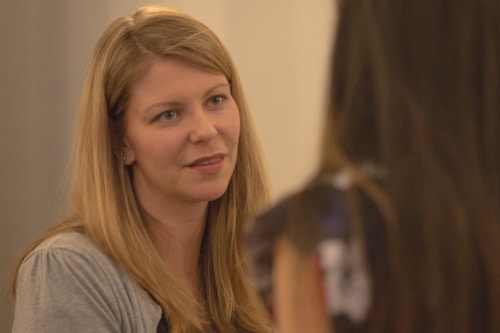
From left: David Hunt, Dr Matt Jameson Evans, John McCarthy
It’s almost 30 years since the historians Neil Howe and William Strauss coined the term ‘millennial’, but the influence and impact of the current generation of young adults shows no signs of slowing.
Much has been written about millennials and gradually their attitudes to health have entered the frame. A recent development has been increasing recognition of the ‘millennial healthcare professional’ as a distinct group.
But for some it’s been easier to dismiss millennials, rather than investigate the positive changes they are bringing to society. So, while Time magazine’s description of the ‘me me me’ generation isn’t without merit, a somewhat more nuanced view is needed.
It was provided at a recent round-table meeting about the impact of the millennial healthcare professional (HCP). Organised by Havas Lynx, the evening’s themes encompassed change, challenges and the future. Ranging from robots to 3D printing, and from entrepreneurship to real-world evidence, the discussions covered a lot of ground, but they were rooted in a series of overarching questions.
Who are the millennials in healthcare?
While participants agreed that defining millennial HCPs by the phrase ‘me, me, me’ was too simplistic, it contains a grain of truth. “They are connected, constantly engaged, can get things done at the touch of a button, always with a smartphone in hand,” said Hiba Saleem, partnerships director of doctorpreneurs.com – a community for medical entrepreneurs – and co-founder of the MedTech Student Network.
David Hunt, CEO of Havas Lynx, added: “It’s too simplistic to suggest that the traditional HCP has transformed into an iWatch wearing, tweeting, selfie addict. In fact, the proliferation of technology has brought significant diversity among clinicians.”
Yet while the inhabitants of ‘Generation Now’ may tend to be younger, they are not always digital natives – it is better to think of them in terms of their behaviours rather than their age. The same goes for millennial patients: the mean age of those using patient social network HealthUnlocked is 52, for example. “Only when you get to 80 is there a drop-off,” explained its co-founder and chief medical officer, Dr Matt Jameson Evans.
But the internet has given a new arsenal of weapons to patients: those seen by Dr Shafi Ahmed, consultant and surgeon, and co-founder of Medical Realities, regularly arrive having armed themselves with YouTube videos and even research on his career. “These aren’t 20-year olds with cancer – they are 60-70 year olds,” he said.
Regardless of age, what patients from all generations share is a desire for immediacy. “They are used to Uber and Amazon, but when it comes to healthcare we don’t have a structure whereby they can get a medical opinion when they want it,” Saleem said. “But the millennial patient wants that.”
Regardless of age, what patients from all generations share is a desire for immediacy
In fact, Dr Claire Novorol, founder and chief medical officer of Ada – a virtual, mobile health companion service, founder and chairman of doctorpreneurs.com, said GPs are now surprised if a patient has not Googled their symptoms and that many arrive with a clear idea of what they want the doctor to do. This means that, in a time-limited environment, GPs are often having to explain why what patients have seen online is not relevant to their condition. “It’s a friction,” she added. “You can find anything you want on the internet: you can convince yourself you have anything. And however high quality the information is, it does not guarantee that patients will read what is relevant to them.”
John McCarthy, vice president of global commercial excellence at AstraZeneca, agreed: “With specialty treatments either the patient, or someone in their family, will have access to the internet and this can definitely influence the conversation with the GP or specialist.”
Many patients – particularly those with rare or chronic conditions – have been supported and empowered by online forums. Engaging with each other as part of a smaller population reduces their sense of isolation and can have a positive impact on their health, thought Dr Rebecca Lumsden, head of science policy at the ABPI. But this access to information does not always work to patients’ advantage. She cited antimicrobial resistance as one area where patients are poorly informed: “There is a challenge around ensuring that information online is properly curated.”

Dr Shafi Ahmed
What is the impact of technology?
Harnessing Big Data – and in particular processing data to make it meaningful for physicians – will be one area in which technology can make a difference, but this is still not straightforward. “The emphasis on technology in the NHS has gone well beyond tokenism,” said Jameson Evans. “But infrastructure is a problem. If you have 300 different systems in a hospital it is not a two-year job to wire them together – it is a ten-year job.”
Likewise, there is innovation – but scaling it up is difficult. “There are pockets of innovation in healthcare in the UK, but that doesn’t translate nationwide,” said Ahmed. “Technology companies run scared of the NHS because it’s difficult to penetrate.”
This will change, of course. Tech giants such as Apple and Google are looking increasingly seriously at health and the application of algorithms and artificial intelligence (AI). In time these advances will replace some HCP roles and could help reduce the administrative burden of others. Meanwhile, Ahmed suggested that in order to help educate the HCPs of the future, app development and coding will have to be part of medical school training.
Algorithms and artificial intelligence will replace some HCP roles in time
“HCPs need analytics,” said Lumsden. “But doctors are not going to be the sole providers of health in future: you will have multidisciplinary teams moving towards much more personalised medicine pathways and we will need data specialists with better data analytics capabilities in the NHS as a whole.”
The NHS may not have the in-house capability to carry out second – and third-generation sequencing in oncology or rare diseases, for example, which means the organisation “will need to engage with these transformative technologies”, she said.
But many of the technological advances already making dents in other industries are more challenging to apply to HCPs. “It is easier to change the taxi and pizza takeaway industries,” conceded Novorol. “It is much harder in healthcare. So, however fantastic the technology, attempting to simply plug those new technologies into existing systems is unlikely to work. Instead a lot of the truly disruptive change in healthcare is likely to begin outside of existing systems, with wider adoption of technologies happening only after their value has already been proven.”
This means that change, although it will come, is unlikely to be rapid.
How are entrepreneurial HCPs changing healthcare?
A number of the round-table’s attendees were entrepreneurial doctors and so able to bring a first-hand perspective to the event’s question of how entrepreneurial healthcare professionals are changing the face of healthcare. They concluded that, while it is not impossible to combine full-time medical practice with life as the founder of a medical start-up, it is very hard.
Millennial HCPs might be more prepared to challenge traditional career paths, but the panel felt there was not enough leeway in the healthcare system at present to allow HCPs with innovative ideas to explore those ideas without having to leave their day jobs. “It is easy to take two to three years out for research, but not for something entrepreneurial,” commented Dr Stephanie Eltz, founder of Doctify, an online health platform for the UK. But venture capitalists are “excited about investing in doctors”, she added. There might, Jameson Evans mused, be room for doctors to act as “entrepreneurs in residence” at technology companies, without having to commit full-time to those companies.
A major barrier is the disconnect between the “risk averse” healthcare establishment, and the mindset of entrepreneurs, which is to “fail fast and break things”, said Novorol. Just finding someone who can give the green light for a bright idea can be difficult in an NHS setting, said Eltz, adding: “Doctors are versatile, passionate and driven – but how do we help them get their ideas into implementation?”
Saleem and Sarah Price, a senior planner at Havas Lynx, suggested that doctors need to be formally taught about the reality of turning ideas into business cases which can be brought to market. The panel also agreed that there is a need for all stakeholders in healthcare to tap into creative ideas. “Most of the success in innovation comes when you mix different skill sets together,” said McCarthy.
The future must address the day-by-day ability of people to manage their own care effectively

Dr Claire Novorol
What does the healthcare’s future hold?
The increased use of AI, robots and even 3D printing of devices will all be part of healthcare’s future, but these tools must always be used in the service of the patient. Going further than this, Jameson Evans said: “The future must address the day-by-day ability of people to manage their own care effectively. There is no platform yet built around patients but it will emerge.”
A greater focus on preventative health – to reduce the need to even see an HCP – is a given, according to Novorol. Managing chronic conditions in the community, with apps to help people improve adherence, will be common. For McCarthy, the future will be more about making the best use of the information that can be collected. “We will get more into predictive analytics – with wearables we will be able to determine which measurements matter most for which condition.”
The industry as a whole must be more heavily involved with care providers going forward, said Lumsden: “Pharma’s transactional relationship with healthcare has shifted to a true partnership, with changes to care pathways and research of medicines.” And as pharma companies are increasingly challenged to prove that their medicines work, the collection of real-world evidence will become vital. “We will need a new generation of digital systems in healthcare to do it,” said Lumsden. “But the people collecting the data should also gain direct benefit from the data – it must be a virtuous circle.”
Turning to other developments, augmented reality and virtual reality are going to be huge, predicted Ahmed. “AI will change the face of medicine,” he added. “So will robotics, allowing much cheaper biosensors for collecting patient data.” Healthcare will follow where consumer tech goes. “If Google, Facebook and so on are doing something, it will come,” he concluded. “VR opens a lot of doors,” agreed McCarthy. “It is going to provide new services.”
Amid the shared enthusiasm about the potential for technological change in healthcare, there were notes of caution. “The biggest shift would be the move to a completely paperless NHS,” insisted Lumsden. “Which we haven’t got to yet. The NHS does need to roll-out innovation and drive ahead – but don’t leave people behind.”
“There is a gap between the incredible innovations you see at conferences and what you know is happening in healthcare,” acknowledged Jameson Evans. “We don’t even have phone reception in some hospitals,” added Eltz
So the hope is that the rising expectations in all areas of millennial HCPs will help drive change. But collaboration – between healthcare, pharma and technology companies themselves – is going to be crucial in achieving success.
Participants
- Dr Shafi Ahmed, Consultant and Surgeon, and Co-founder of Medical Realities
- Dr Stephanie Eltz, Founder of Doctify
- David Hunt, CEO Havas Lynx
- Dr Matt Jameson Evans, Co-founder and Chief Medical Officer of HealthUnlocked
- Dr Rebecca Lumsden, Head of Science Policy, ABPI
- John McCarthy, Vice President, Global Commercial Excellence, AstraZeneca
- Dr Claire Novorol, Founder and Chief Medical Officer of Ada, Founder and Chairman of Doctorpreneurs
- Sarah Price, Senior Planner, Havas Lynx
- Hiba Saleem, Partnerships Director of Doctorpreneurs and Co-founder of MedTech Student Network
- Dominic Tyer, Editorial Director, PMGroup and Chair
For more information on the millennial healthcare professional visit www.m-hcp.com





